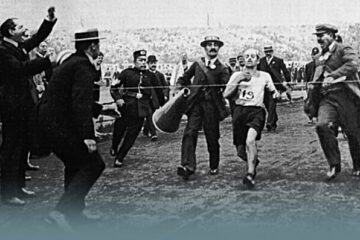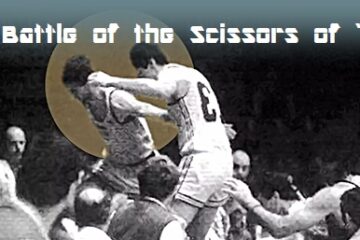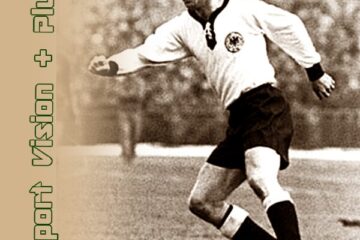1974 | Vim Van Hanegem: “My final against the Nazis”!
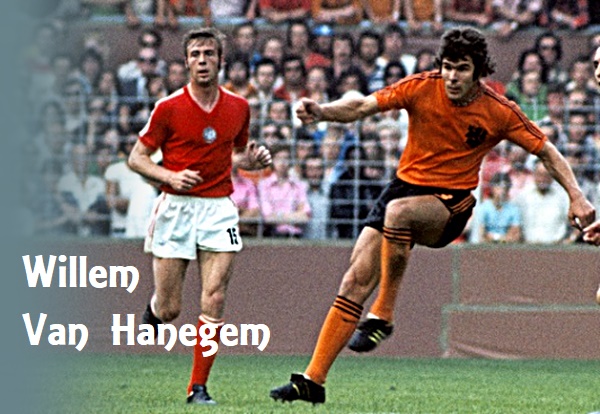
“Tales of the ball! Events and champions without similarities one to the other”
“I have never been able to find a reason to forget. For me it was enough to win 1-0, but what I was more interested in was to humiliate them and humiliate them and then humiliate them again until there was nowhere to go further”
“Berti Vogst, is a bastard, arrogant, I want to break his legs”……..I hate them”!
From the title, such a testimony seems a bit heavy, but this was actually the opinion and statement of the Dutch midfielder, Willem Van Hanegem, of Cruyff’s great Dutch team, said publicly before the 1974 final, who, even after 30 and more years of the end of the 2nd World War, continued to consider such Germans, Nazis.
They are real facts and evidence which until now have been hidden or censored, but recently, the tireless investigative work, the persistence of professional journalists all over the world has made these events, evidence, facts and opinions publicly, they deserve to be brought out of the darkness and their truths to be known to the public, as they happened.
“Sports Vision + / The Hour of Champions” has made it possible to share with public one of these events, precisely this case of the Dutch player and his extreme statements against the German representative.

Who is Willem Van Hanegem?
For many people in the world, the name Willem Van Hanegem may mean very little. In the Netherlands and to those particularly associated with Feyenoord and the Dutch national team, he is still very well remembered and respected. Ajax had their hero and talisman in Johan Cruyff, Feyenoord also had theirs in Wim Van Hanegem or as it is often called “De Kromme” which in English means “Crooked”.
Van Hanegem earned this nickname due to his angled passes and stooping stance that would be typical of his style of play. De Kromme’s playing career spanned 21 years, where apart from a brief stint in the US with the Chicago Sting, he played the rest of his career at clubs in the Netherlands. Namely Velox SC, Xerxes, AZ67, FC Utrecht and twice for Feyenoord – the club where he would become a legend both as a player and manager in the future. It is no surprise that in the club shop at the De Kuip Stadium, where Van Hanegem’s face appears more than any other player, such is his legendary status.
“Too slow and too one-dimensional. It is not suitable for modern football” –
Rinus Michels.
Van Hanegem was 24 when he signed for Feyenoord after being seen as not good enough for Ajax and Rinus Michels. Thus he joined a team that at the time was full of legends and household names such as Wim Jansen, Rinus Israel, Coen Moulijn, Ove Kindvall and the legendary manager Ernst Happel.

It was a perfect combination as both were physically intimidating, strong minded and very technically skilled. Van Hanegem was part of the Dutch club that won the European Cup in 1970, he won the Intercontinental Cup also in 1970, three Eredivisie titles in 1969, 1971 and 1974, a UEFA Cup in 1974 and two KNVB Cups in 1969 and 1978. He would later returning to Feyenoord as coach between 1992 and 1995 where he would also show that he had the skills to be a successful manager, proving it by winning the Eredivisie title in 1993 and two KNVB cups in 1994 and 1995.
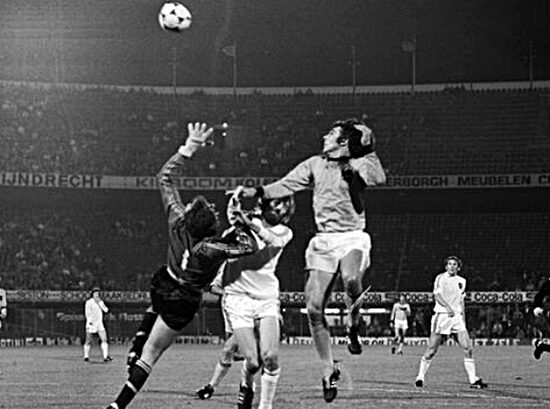

But what kind of player was Van Hanegem?
He was a fierce attacking midfielder and an excellent passer of the ball, which is where his nickname “De Kromme” comes from. He was not the fastest, but he “read” the game very well.
Alongside Wim Jansen, Arie Haan and Wim Suurbier, De Kromme provided the physicality and aggression that allowed Hollande to control the tempo of the game, while Johan Cruyff’s leadership reinforced Rinus Michels’ Ajax playing philosophy.
Accuracy, variety and quality made him part of the great Netherlands in the 1974 World Cup of Cruyff and Rep, of Neeskens and Haan. Van Hanegem played a major role in enabling Cruyff to win the “Player of the Tournament” award.
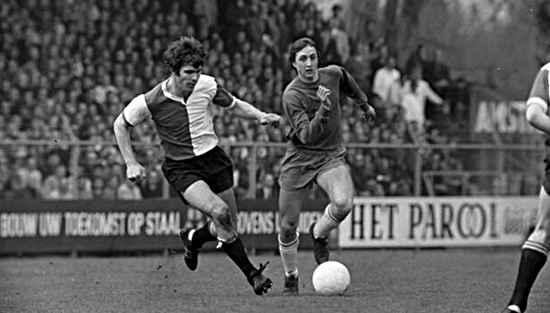
But not all of Van Hanegem’s life is about success and great moments. He was born on February 20, 1944 in Breskens in the Zeeland region, where at this time the second war was still in progress and Holland was under German occupation. The life and football career of Wim Van Hanegem has been a strong stream of emotions, personal successes and tragedies.
However, what is clear and must be emphasized is that he was a warrior footballer, a model and an example of a football that used to be completely different from today’s, which only has more palaces, big salaries and fast and luxurious cars.
* * *
It was still the warm fishing season. There were those residents, who in the Netherlands lived by fishing, throwing hooks and nets into the North Sea, they knew very well that the arrival of the cold would interrupt their work.
The summer was ending and unfortunately it was the summer of 1944, the season when the second world war was still going on.
It was September 11th. The Allies were trying to enter Europe occupied by Germany that was struggling, but which was ready to do anything to stop it, any attack and prevent the entry of any help from the US-England allies. In this area of the world, war and fishing have a certain similarity, because everyone knows that these are the last days and they try to get out of themselves everything that these people have the ability to do.
For some, this is a good thing, but for the invaders who want to stop everything, no! In Breskens, it was already three generations that the Van Hanegem family lived only by fishing. There were so many of them from this family that in order to provide them with one bed, two large farm houses were needed, from those that were built along the banks of the Skelda River.
All the way across the banks of the Skelda River, which resembled a channel of immense length, about 100 km, from Antwerp and the North Sea. This has always been a strategic commercial place at all times, but for the Germans who have occupied it, it is a strategic place to stop the advance of the allied troops in Europe, those troops who had landed in Normandy two months ago. So, if you have to reach Berlin from Normandy, then you definitely have to pass through this country.
The Van Hanegem family, however, was not so focused on these things, as they were engaged in fishing and were more preoccupied with providing daily bread for the many members of this family, thank God, in contrast to the war and the situation where hunger was discouraging hopefully, the number increased more and more.
The youngest member who was added to this family, was born seven months ago and father Van Hanegem named him with the name that he himself had heard most throughout his life, that is exactly his name, Willem.
So in this season of summer v. 1944, which was still the season of fishing and war between Germany and the rest of the world, here in Breskens, near the banks of the river Skelda, father Willem Van Hanegem was holding his baby son, Willem Jr, the future Dutch midfielder, of course, he won’t be able to remember his father’s hug, the look of the man who brought him to life. For the Germans, the banks of the river Skelda were a natural barrier in the defense of the Reich, and for this the Nazi army decided that the moment had come to undertake a cleansing action of the local population. Even here in Breshkens, the Van Hanegem family and about one hundred other families, fishermen, women, boys and girls, were killed, disappeared and everything was burned.
Nazi airplanes flew over several times until the entire area of Breskens was flattened, not a single bomb was forgotten to be released by the heartless Nazis. Among the hundreds of victims, under the ruins of a country that no longer existed, the father Van Hanegem, the three small children, an uncle and three cousins were left dead.
Meanwhile, seven-month-old baby Willem Jr., no one knows how he managed to survive such slaughter. Breskens was a small town with a few hundred inhabitants and since it was impossible for each victim to have their own coffin in that very small cemetery, it was decided to make a common grave for all those who had lost their lives on that terrible night. , when people were asleep.
This common grave for little Wim Van Hanegem will not be the lost memory of his father’s face as he held him in his arms, but will remain in his memory every day of his life and every day he will be consumed in that great pain.
“I hate them. All I want is to humiliate and humiliate them…..they have killed my father, my two brothers and my sister…”.
Over the years, the current pain of the boy Van Hanegem, had taken the harshest form, the feeling of hatred. This almost always happens to children who have suffered such dramas, physical or psychological violence, abandonment. This is what happens at a young age when it is impossible to properly understand the nature of the event, its consequences and always thinking why exactly it is happening to me. For example, dramas such as “why my mother abandoned me”; “why the father is violent”; or like this very tragic case of the famous Dutch player from the 70s.
When you are in this vicious circle, sometimes all that pain and hatred becomes your strength, those who have experienced such traumas. But in other cases it can also be your trap.
In Wim Van Hanegem, the hatred and anger were not lost, they even had the force of water that in some cases gives the impression that it flows quietly, but in other cases, floods you with its rapture and fury. Even when you are a skilled football player and struggle to remove the ball from the opponents’ feet, the field brings out what is inside of you. Whoever follows you around from the stands, it doesn’t take much to label you in the worst way.
Ernest Hapel, the coach who gave him his sports form, was the only one who encouraged him instead of labeling him. Wim Van Hanegem has never been a bad person, but only a footballer who will be the strongest of all, which means not only better than the opponents in football, but also as a person in the feeling of revenge against than the past. Over time, he had become a potent, strong and wild midfielder. Sharp as his facial features, he has a strong build, slightly arched legs, and broad, curved shoulders.

All the newspapers of the time openly called him “de gebochelde” hunchback in the most direct way! I don’t even know Vim Van Hanegem, nor does the opinion of him make an impression because he is a man with a strong character, as sharp as his facial features. When you looked at him playing on the field, you noticed that in that slightly deformed and bent body, perhaps from life, like many children who have spent their childhood filled with anger and hatred, there was a rare and infinite beauty.
A complete player, with those always correct ball releases for his teammates even when they were in the most difficult positions or completely on the other side of the field. He had an inhuman delicacy and accuracy with the ball. He often hit with the outside left, surprising everyone, even those who knew this ability of his. Among other things, he possessed a strength and accuracy even in headers, or in the execution of free throws. She was a player who amazed everyone and belonged to the school of the “Feyenoord” team in Rotterdam.
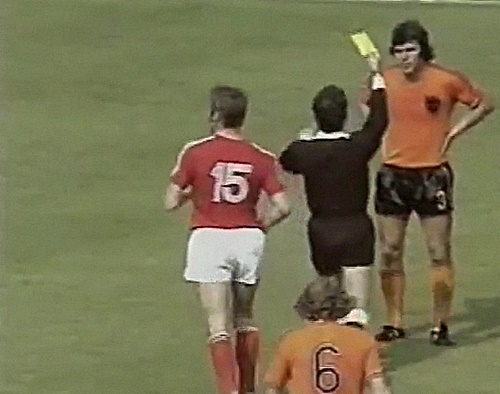
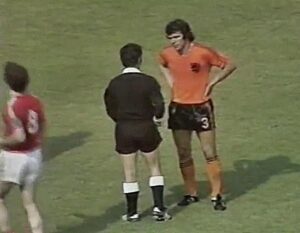
It was the end of the 60s and the beginning of the 70s. Holland was becoming the most modern cradle of football that had ever been seen. It was football where every player in this team played and knew best every position in the tactical scheme.
That’s how it happened that the central attacker turned into a central defender, and the defenders jumped forward as attackers. It was a harmonious anarchy. If you look at it, you will immediately see the fantasy and beauty of this modern football that actually came from the school of the Ajax team in Amsterdam. It was these players who knew how to best embody this way of football by identifying it with their equally beautiful and rich city of a bourgeois class, with an open mentality.
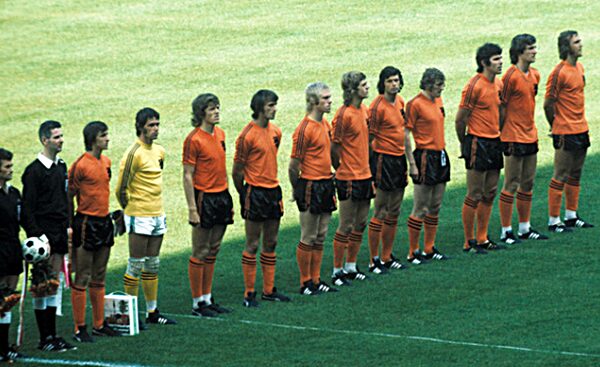
Whereas Van Hanegem’s Rotterdam was, on the contrary, a city grown up and created around that port where people ate lunch and dinner together and where beauty was a luxury for a few. For this, Feyenoord of Rotterdam was the team that survived and yet they were the first to bring the first trophy of the Champions Cup to the Netherlands, which was then followed three times in a row by Ajax.
It was 1970 when Wim Van Hanegem’s Feyenoord was in the “San Siro” stadium in Milan, holding the final of the Champions Cup, against Celtic of Glasgow.
Vim Van Hanegem would tell: “Our observers told us that it is pointless to go to Milan, because they run like possessed, so we will surely lose. When we were at a disadvantage on the field, everything seemed predetermined. However, something happened. We put aside the preoccupation, the pressure and that’s the only way we overturned the result and the Cup became ours”
So, the Feyenoord players put aside fear, anger, pressure, negative emotions and removed that weighed on their heads, they managed to see each other clearly in the eyes and then the opponent, winning the match and the first trophy for any Dutch club in the Champions Cup.
That was the match Van Hanegem played in despair and as if it was the last match of his life. For him it was always a matter of “life or death”!
E. Hapel, the coach who led the Feyenoord team, champion of Europe, told it like this: “With this feeling of desperation, with the idea that every match was decisive for life, Van Hanegem would face the big final of the World Cup of the year 1974 against West Germany”.
In Munich, the Netherlands of total football, of Cruyff, Neeskens, Rep, Han and Krol, would face the masters of the house, the West Germans of Beckenbauer, Vogts and Gerd Mueller.
“I never liked them, I didn’t like meeting them. I can’t concentrate, every time I’m going to meet them, I can’t control myself. I am suffocated by all the feelings I have inside. I hate them. What I want is just to humiliate them and humiliate them to the point where it doesn’t go any further. They killed my father, my brothers and my sister, so I hate them”
That’s what he said, without any measure of self-restraint, quite openly, publicly, on the eve of the grand finale. 1974, against the Germans whom he calls Nazis even though it has been more than 30 years since the war ended.
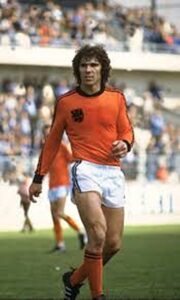
In fact, it is not only Wim Van Hanegem in that great team, but there is also another Feyenoord player, blond Wim Rijsbergen, who had several family members lost their lives during the bombing by the Nazis that night along the banks of the river Skelda in in 1944! There is even a third Vim, Vim Surbier, who plays with Ajax, but who is a boy with a heart of gold . These three, Van Hanegem, Rijsbergen and Surbier, are convinced that the Netherlands in the final should not only win, but also make them look ridiculous, humiliate the Germans.
According to them, this would be a kind of punishment against these “Nazis”. But it is well known that hatred, anger, leads nowhere except to self-destruction!
The Germans know very well that their opponents are a great team that just watching them on TV while they play gives you headaches and dizziness, from the way they circulate the ball, how they run, how their game mechanism works while the attackers withdraw and leave spaces for the defenders to come forward quickly. Their positions are mobile, they all come forward in attack and also they all know how to quickly return to defense.
This team leaves no reference point.
Then how this could be done?
Not in vain, Germans tried throughout the tournament, calculating the qualification to avoid the confrontation with the Dutch jugglers as long as possible, and hoping that the latter they wouldn’t reach the finals.
The Dutch superiority is so evident that the Germans take into account and examine everything in the smallest details.
Bernd Hölzenbein, the striker of the German RF, will remember: “We knew that they were the best team, that’s why we decided to appear before them and demonstrate without fear that we really had it inside us. Immediately as soon as we were in the entrance tunnel, we had to look them straight in the eyes, one by one, each one of them. Well, when the moment came, I didn’t manage to take a look at them and I wasn’t the only one who went to the field looking ahead or just down ….. “

However, in the field, the Germans actually proved to be more rational, more cool-headed and used exactly such qualities that the Dutch lacked. On the field, the Dutch proved to be a non-compact team, arrogant and full of anger, angry that things were not going the way they thought, or better the way they wanted, the great players of total football.
They had overestimated themselves much more than they should and were convinced that the victory over the opponent would be easy.
The Dutch forgot that they were playing in the final against an experienced team that had won the World Cup in 1954 and that they had played two semi-finals in 1958 and 1970 (losing to Sweden and Italy respectively) and had also lost in the big final in 1966 against the England (2-3).
For the Dutch, the greatest success was the 4 Champions Cups achieved by the clubs Feyenoord (1970) and Ajax (1971-1973).
“We lost the match for some reasons. Our national team was divided into two groups. On the one hand, there were those who wanted to humiliate the German RF and on the other hand, those who felt superior and who thought they would achieve it without many problems. Wim Van Hanegem, belonged to the first group.”
Someone was blinded by anger, others, on the contrary, had decided to play with arrogance, while the Germans were rational opponents, ready to react well even when they seemed inferior.

“Oh, how I would like to cut off Berti Vogst’s leg, because he is a bastard, arrogant like all Germans . The Nazis have wiped out my entire family, and until I breathe, I will have an open account with them.”
Van Hanegem himself, at one point, instead of supporting the action, takes the ball and starts doing numbers as if it were the last section of a training day.
The phrase “even if we won 1-0 was enough for me, but what worried me more was to humiliate and humiliate them…”, he will repeat it several times. Underestimating the opponent, the competition and even the spectators and others who follow the match in front of the screen, will not pass without consequences.
For these reasons, the Netherlands takes the lead after just one minute, and also for these reasons that the West Germans equalize the result of the match and manage to turn everything in their favor by doing what was unthinkable.
This defeat brought the Dutch back to the clarity that the Germans are always “the beauty of the bad” in every part of the game, in every match of a tournament, as was this grand final.
When Muller performs such an opportunistic action, positioned in the heart of the penalty area, with his back to the goal, hitting the ball with a quick turn, he responds to total football by scoring a goal, as a result of cunning and not German philosophy.
Precisely at that moment, the world that the Netherlands believes they have under themselves , for a moment, turns upside down.
Herman Kuiphof, the most famous Dutch television commentator, who for the first time broadcasts a World Cup final directly on television, once after that goal, quotes few words but which have the content of several history books and song lyrics. “ze hebben ons ooundeer georgendeed, ze gooien het oeoondeo naar ons” (the Germans, they condemned us again, they fooled us again”)!!!
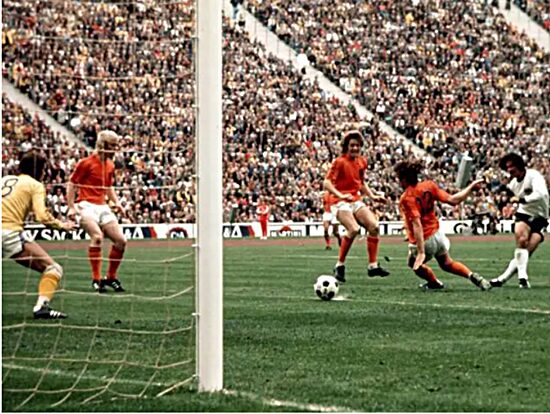
As we all know, the Netherlands will never be able to equalize that goal of Mueller, and Wim Van Hanegem will leave the field in tears and regret. His anger and hatred had doubled!
To that tragic event of history during the war, this one of football was added without being able to take revenge, according to his reasoning.
Everything happened exactly like in the final of the Champions Cup in 1970, when Wim Van Hanegem’s Feyenoord lost to Celtic 0-1. Immediately, as soon as the Dutch players, who before the confrontation with the Scots had said that it would be better not to play that match at all because defeat was certain, put aside negative emotions, fear, pressure, anger, over evaluation, not only that they succeeded to draw the match, but they could win the first trophy in the club category for the Netherlands.
Who knows it better than the well-known midfielder Wim Van Hanegem?
In football, it has been proven several times that the favorites or the best team does not always win, especially when this team has in its organic players who underestimate the opponent and are guided by the feeling of superiority, they get angry even worse when they want to take revenge on the opposition for something traumatic that happened in their childhood.
Cruyff, the greatest player of all time not only for the Dutch, will say: “Van Hanegem has an advantage over me. When I’m in bad shape, I’m useless. When Van Hanegem is in poor form, he rolls up his sleeves and starts hitting”.
By Pjerin Bj | The exclusivity on this page is dated August 25, 2024
_______________________
Sports Vision + / Hour of Champions in activity since 2013
References: The show on Radio Rai “Podcast” by the Italian journalist F. Graziani | Various online resources| Andries Oosterveen and his story about Vim Van Hanegem.
Discover more from Sports Vision +
Subscribe to get the latest posts sent to your email.


